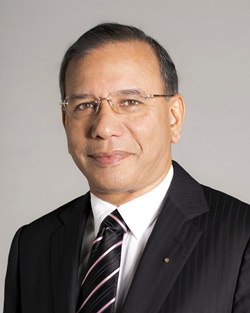Ravindran urges Rotarians to give gifts of time, talent, and knowledge
K.R. “Ravi” Ravindran, a business leader from Colombo, Sri Lanka, took office on 1 July as the 105th president of Rotary International – a global network of 1.2 million volunteers dedicated to tackling the world’s most pressing humanitarian challenges.
Ravindran, a member of the Rotary Club of Colombo, says a top priority will be to strengthen clubs by attracting men and women committed to improving communities worldwide through volunteer service.
From supporting local food pantries to providing clean water in remote villages, Rotary clubs join forces to carry out impactful and sustainable projects at home and abroad. And Rotary members often are both first-responders and re-builders when major disasters strike, because Rotary clubs are present in every corner of the world.
 K.R. “Ravi” Ravindran.
K.R. “Ravi” Ravindran.
Following the earthquake that hit Nepal earlier this year, Rotary members were among the first to respond. “Medical teams arrived from Singapore and India. Solar lanterns, shelter boxes, tarpaulins and tents, water filters and medicines followed,” said Ravindran. “And hundreds of thousands of dollars have been raised to help rebuild the lives of the millions who have lost their homes. When the camera crews leave, when the eye of the world looks elsewhere, Rotary will continue to remain.”
After the devastation of the 2004 Indian Ocean tsunami, Ravindran led Rotary’s recovery efforts by helping to raise US$12 million to rebuild 22 schools, enabling nearly 15,000 children to resume their studies. “The tsunami could take away schools, homes, possessions, and even loved-ones, but it would never be allowed to take away the spirit of children,” said Ravindran.
As president, Ravindran will oversee Rotary’s top humanitarian goal of eradicating the paralyzing infectious disease polio. The Global Polio Eradication Initiative, formed in 1988, is a public-private partnership led by Rotary, the World Health Organization, the U.S. Centers for Disease Control and Prevention, UNICEF, the Bill & Melinda Gates Foundation, and governments of the world. Rotary’s focus is advocacy, fundraising, volunteer recruitment and awareness-building. Rotary Club members worldwide have contributed more than US $1.4 billion and countless volunteer hours to the polio eradication effort.
Today, there are only three countries that have never stopped transmission of the wild poliovirus: Afghanistan, Nigeria, and Pakistan. Less than 370 polio cases were confirmed worldwide in 2014, which is a reduction of more than 99.9 percent since the 1980s, when the world saw about 1,000 cases per day.
As Sri Lanka’s chair of Rotary’s polio eradication efforts, Ravindran led efforts to eradicate polio from Sri Lanka. His country became one of the first in Asia to become polio-free in Asia. The PolioPlus task force which he headed consisted of representatives from Rotary, UNICEF and the Sri Lankan government. The partnership successfully negotiated a ceasefire with the northern militants to allow polio immunizations to continue during scheduled National Immunization Days.
Ravindran is founder and CEO of Printcare PLC, a publicly listed company and global leader in the tea packaging industry. He also serves on the board of several other companies and charitable trusts. He is the founding president of the Sri Lanka Anti-Narcotics Association, the largest antinarcotics organization in Sri Lanka.
A Rotarian since 1974, Ravindran has served Rotary as a director and treasurer of Rotary International and as a trustee of The Rotary Foundation. He has been awarded The Rotary Foundation’s Citation for Meritorious Service and Distinguished Service Award and the Service Award for a Polio-Free World.
About Rotary
Rotary brings together a global network of volunteer leaders dedicated to tackling the world’s most pressing humanitarian challenges. Rotary connects 1.2 million members of more than 34,000 Rotary clubs in over 200 countries and geographical areas. Their work improves lives at both the local and international levels, from helping families in need in their own communities to working toward a polio-free world.




